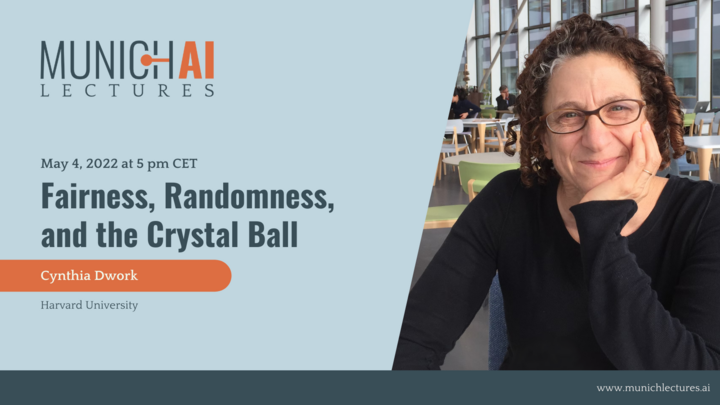On a monthly basis, we invite top-level AI researchers to give us a glimpse into their work and the future of AI. Our lectures consist of a short presentation followed by a Q&A to enable a lively discussion with our speakers. Each lecture lasts about one hour and will be streamed live. Recordings will be available on YouTube afterwards.
We are very happy to welcome Prof. Cynthia Dwork from Harvard University, who will give the inaugural lecture on “Fairness, Randomness, and the Crystal Ball”. You can find the abstract and a short bio below. The lecture will take place virtually on May 4, 2022 at 5 pm CET. More details can be found on our website.
We are looking forward to welcoming you on May 4. Feel free to promote our event through your channels.
Title: Fairness, Randomness, and the Crystal Ball
Abstract: Prediction algorithms score individuals, or individual instances, assigning to each one a number in the range from 0 to 1. That score is often interpreted as a probability: What are the chances that this loan will be repaid? How likely is this tumor to metastasize? A key question lingers: What is the “probability” of a non-repeatable event? This is the defining problem of AI. Without a satisfactory answer, how can we even specify what we want from an ideal algorithm?
This talk will introduce ‘outcome indistinguishability’ — a desideratum with roots in computational complexity theory. We will situate the concept within the 10-year history of the theory of algorithmic fairness, and spell out directions for future research.
Bio: Cynthia Dwork, Professor of Computer Science at Harvard, Affiliated Faculty at Harvard Law School, and Distinguished Scientist at Microsoft, is renowned for placing privacy-preserving data analysis on a mathematically rigorous foundation. She has made seminal contributions in cryptography and distributed computing, and, starting in 2010, launched the field of the theory of algorithmic fairness. A recipient of numerous awards. Dwork is a member of the US National Academy of Sciences and the US National Academy of Engineering, and is a Fellow of the American Academy of Arts and Sciences and the American Philosophical Society.

